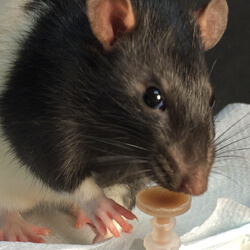
A rat enjoys some chocolatey liquid. Ellen Ambrose, Johns Hopkins Medicine
Johns Hopkins neuroscientists believe they have figured out how some mammals’ brains—in this case, rats—solve navigational problems. If there’s a “reward” at the end of the trip, like the chocolatey drink used in their study, specialized neurons in the hippocampus of the brain “replay” the route taken to get it, but backward. And the greater the reward, the more often the rats’ brains replay it. The finding suggests both the presence and magnitude of rewards influence how and how well the hippocampus forms memories.
“We’ve long known that the brains of awake animals have these replay events when they pause in their travels...
Read More








Recent Comments